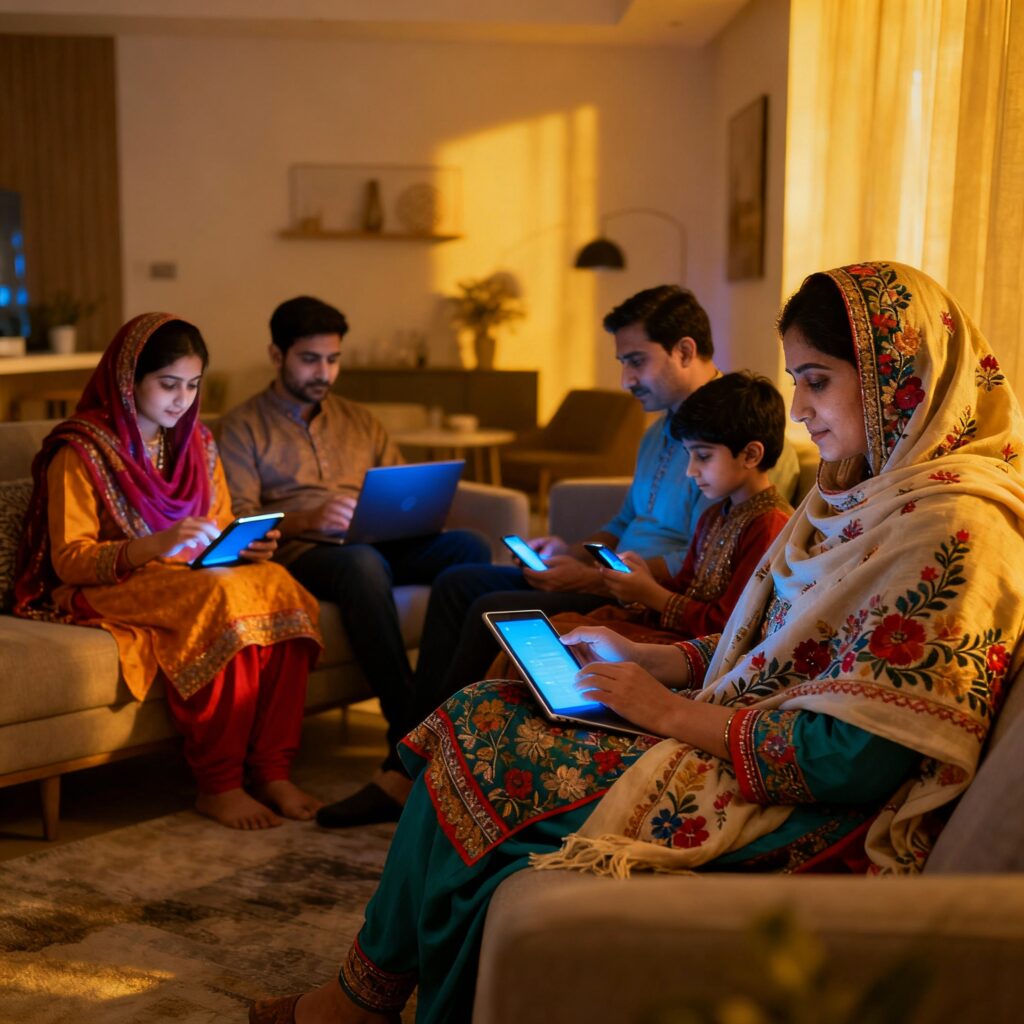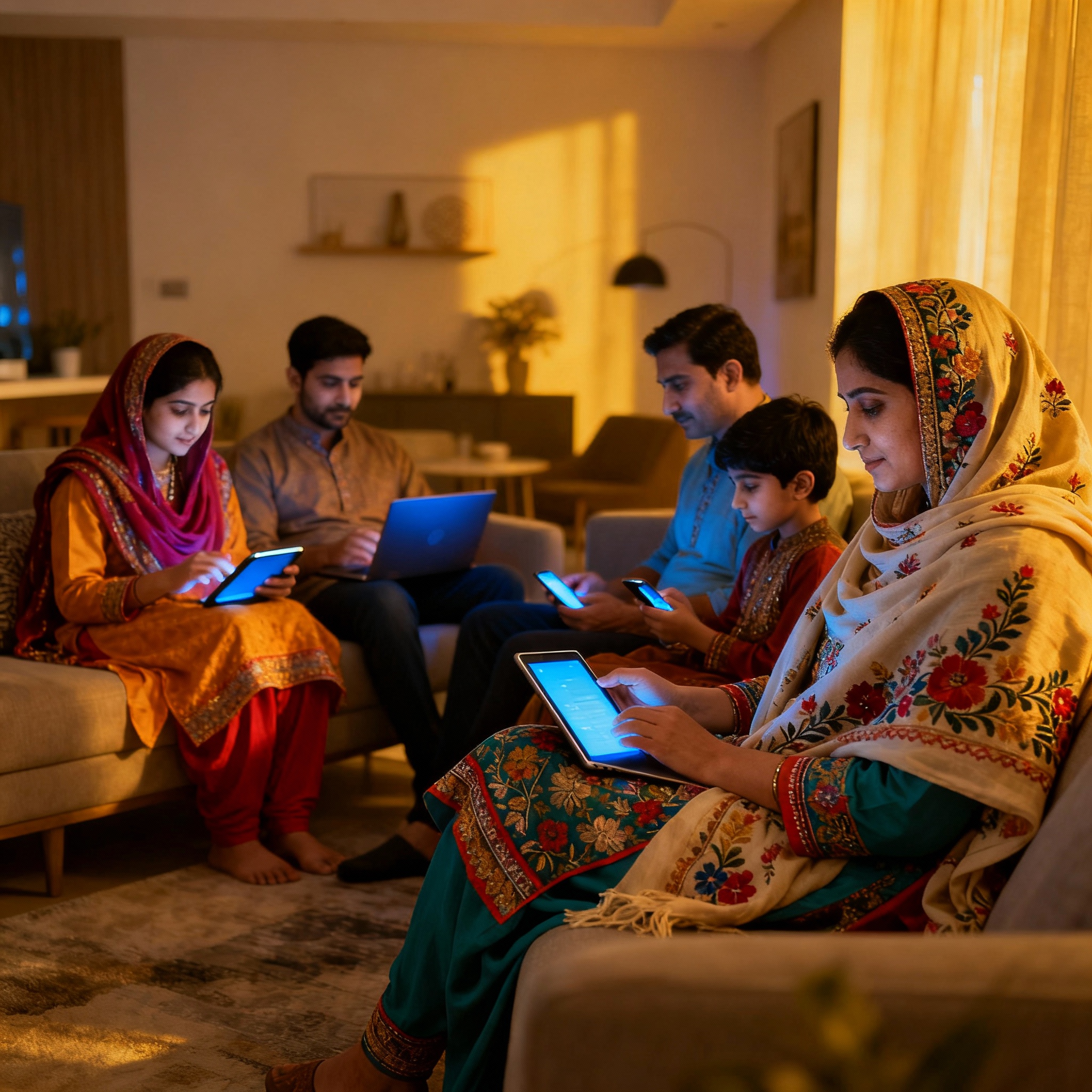Technology connects the valley to the world, but it also risks disconnecting families from their own roots
By Uzma Saleem Khan
Kashmir — the land of mountains that whisper stories and rivers that hum lullabies. For centuries, this paradise has been more than breathtaking scenery; it has been a cradle of traditions, respect, and faith. Yet beneath the calm of its lakes and the beauty of its gardens lies something fragile: the quiet erosion of values that once defined Kashmiri society.
This land was never celebrated for its beauty alone. Its soul rested in its culture — the language spoken at hearths, the folktales that passed wisdom from elders to children, the crafts that carried the spirit of artisans. Modesty, hospitality, humility, and mutual respect were not abstract ideals but daily practices. Today, however, that inheritance is fading. Kashmiri is spoken less in homes, traditional attire is reserved for weddings, and centuries-old crafts struggle against factory-made imitations. The values that gave the society depth and character now fight to survive in the noise of global trends.
Among the youth, this transformation is stark. For young women, modesty (hayaa) and grace (waqar), once celebrated as strengths, are increasingly dismissed as outdated. A culture that saw dignity in humility now often interprets self-restraint as weakness. Global fashions, amplified by social media, blur the lines set by faith and tradition and are embraced as symbols of “confidence” and “modern thinking.” At the same time, bonds of sisterhood, once nurtured through shared support, weaken as competition and ridicule replace solidarity.
Young men, too, are touched by the same drift. Words once used to uplift are now often used to objectify, reducing women to appearances or casual remarks. The Prophet Muhammad (peace be upon him) reminded, “The best of you are the best to their women” (Tirmidhi), but such guidance fades against the backdrop of careless behavior and borrowed attitudes. Dignity and respect, once the measure of a man’s character, risk being replaced by bravado and disregard.
Technology has deepened this crisis. The smartphone that connects us to the world has also disconnected us from our roots. Children who once gathered around elders to listen to folk stories now scroll endlessly through reels and trends. Family gatherings that once echoed with Kashmiri poetry, riddles, and songs are silenced by glowing screens. In chasing likes, we forget love; in seeking attention online, we neglect those sitting beside us. The fault lies not in technology itself but in our dependence on it, allowing fleeting virtual applause to matter more than enduring respect and relationships.
Family, the backbone of Kashmiri society, shows the strain most clearly. The joint family system was not just a structure but a shield — one that shared burdens, offered dignity, and passed down wisdom across generations. Today, many families still sit at the same table but remain strangers, each consumed by a digital world. Respect for parents is challenged more often, and the warmth of extended kinship has thinned into isolation. If this disintegration continues, the very foundation of Kashmiri society will tremble.

And yet, the decline is not irreversible. Islam provides the framework for restoring dignity and balance. The Quran reminds: “The believing men and believing women are allies of one another. They enjoin what is right and forbid what is wrong…” (Surah At-Tawbah 9:71). This is not a call to criticize or compete but to guide and uplift. Families can begin by reviving simple traditions — telling folktales, celebrating festivals with authenticity, and speaking Kashmiri at home. Schools can give pride of place to local history, literature, and crafts, ensuring children know the worth of what is theirs. Youth, too, hold responsibility: to choose modesty with pride, to value respect over ridicule, to support artisans and preserve the cultural threads that bind their identity.
True freedom does not lie in imitating the West or chasing applause but in living with dignity, peace of mind, and harmony with divine guidance. Real progress means balancing education with values, blending modern opportunities with cultural pride, and pairing global awareness with spiritual grounding. This is not a call for retreat from the modern world but a reminder that modernization without moral grounding is hollow.
Kashmir’s snow-capped peaks may endure for eternity, but the moral foundation of society is far more vulnerable. If values continue to erode unchecked, this paradise will lose its soul. But if its youth rise with faith, respect, and responsibility, Kashmir can remain not only a land of beauty but a land of honor. For in the end, if we lose our culture, we lose ourselves — and no paradise is worth living in without its soul.
The views expressed in this article are solely those of the author and do not necessarily reflect the opinions or views of this Magazine.


Leave a Reply